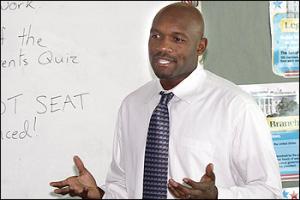Often, particularly in urban schools and districts, someone asks: “Where are the black male teachers?”
Statements affirming the need for more black male teachers are commonplace. As an experienced black educator and former assistant principal, I have heard assertions that more must be done to increase the number of black educators in our schools. I have also seen the tremendous impact an effective black male educator can have in the classroom. Notice I use the word effective; this is because an ineffective black male educator can have a more detrimental impact on a school than perhaps a teacher from any other demographic.
If I am being candid, I can attest personally to the fact that in many schools, the only abundance of black men comes in the form of custodians, food-service employees, and transportation workers. In addition, in conversations with my colleagues, it is widely understood that if black men are educators, they more often than not are physical education teachers or coach in some capacity. Black men are largely underrepresented in our nation’s classrooms; it has been widely reported that they make up less than 2 percent of our country’s teachers.
U.S. Secretary of Education Arne Duncan is heading up several initiatives to help recruit black men into our classrooms, most notably TEACH.org, a public-private initiative with a mission to “help great candidates find places in today’s rapidly evolving classrooms.” However, could all efforts to increase the number of black men in the classroom be in vain? I think so. Let me explain why, and what we can do to help.
Fit. According to recent data from the National Center for Education Statistics, nearly 82 percent of public school teachers in school year 2011-12 were white. When black men first enter the classroom, there is a high likelihood that they may be only one of maybe two or three black males on the staff, even in some predominantly black schools and districts. When hiring decisions are made within a school, they largely depend on “fit”: Will this person fit in at our school, and how well? Needless to say, adding a black man to the staff will automatically change a school’s dynamics.
As a black male teacher who has mentored other black male teachers, I can speak to the fact that parents, students, and fellow teachers may watch the black male employee more closely because of the rarity of the situation. The educator as well as the school community must be prepared for this. It takes a certain amount of character to accept and live up to this reality and the expectations that come with standing out.
Challenge: As a teacher or administrator with a black male teacher on staff, inquire periodically about his comfort level and/or difficulties he is having. Reassure him about his importance to the staff as a whole. Find time to debrief with him generally in an open and honest dialogue independent of any evaluative repercussions.
Lack of mentoring. A deficiency of black males in the classroom obviously leads directly to a lack of them in school leadership roles, such as principal and assistant principal. Educators have long said that mentoring is a key to success for many new teachers. In fact, many districts have mandatory induction programs for first- and second-year teachers.
Part of the mentor experience includes pairing the new teacher with an administrator or teacher who will observe, discuss research, and share experiences in an effort to foster the novice’s growth as an education professional.
The expectation is that new educators will have mentors who have their best interests and professional growth at heart. I honestly think it’s a challenge for black men to find someone in their school willing to level with them and be honest about the great responsibility that comes not only with being an educator, but a black male educator at that.
So many times I’ve personally seen young teachers written off and led astray by “mentors” who didn’t mentor them and allowed them to sink into what can be a professional abyss. If any teacher is not given the proper support, it is easy to be consumed by the overwhelming responsibility of being an educator.
Challenge: When black male teachers are on the staff in urban schools that need their presence, it is imperative that a concerted effort be made to provide these men with caring, spirited mentors who understand their importance and vigorously provide them guidance.
You can’t be what you don’t see. So many times it is said black boys want to be rappers or athletes because when they turn on the television, that’s what they see. If more black male teachers were in our nation’s classrooms, it would dramatically alter children’s aspirations. I wrote this Commentary because I believe every single conversation about education today must begin with the need to increase diversity in the teaching force. A conversation about standards, teacher quality, or graduation rates cannot begin without a vigorous effort and commitment to this cause.
Think about the first time you had a black male teacher, if ever. If you did, chances are you will never forget him. I firmly believe that if we put positive black men in front of these students, more young black boys will aspire to be educators.
Challenge: Ask two people how many African-American male educators they’ve had in their K-12 school careers. It is my hypothesis that most will give you an answer between zero and two. Continue the conversation by affirming the need to increase this number.
Poor achievement among our neediest students is the result, at least in part, of a lack of strong, positive black educators in the classrooms. This nation needs to move swiftly to engage more African-American men in teaching. No longer can we simply be OK with black men representing less than 2 percent of our teacher workforce. It is unacceptable.
Donald G. Nicolas is a 5th grade teacher at a public school in Broward County, Fla.

